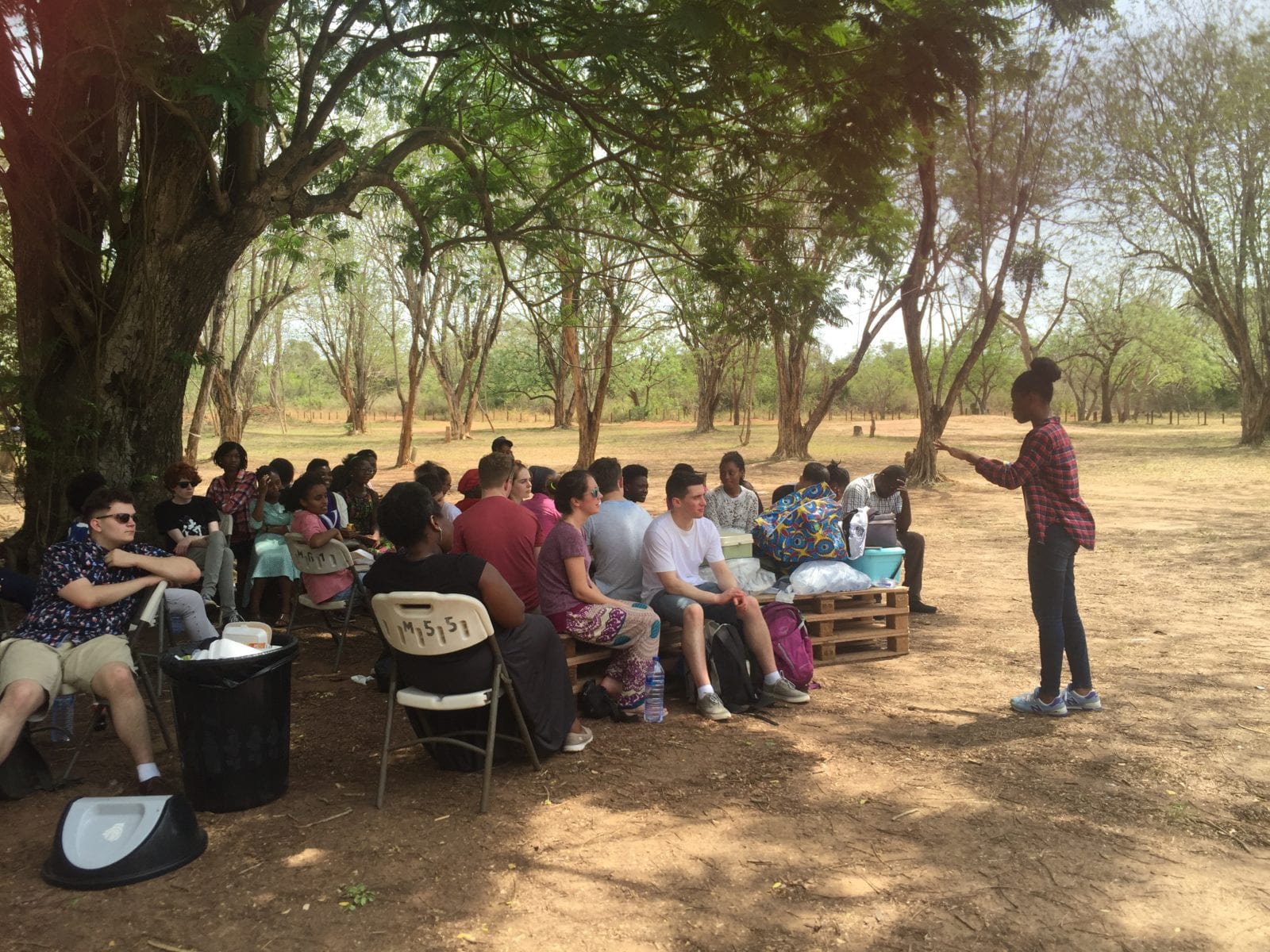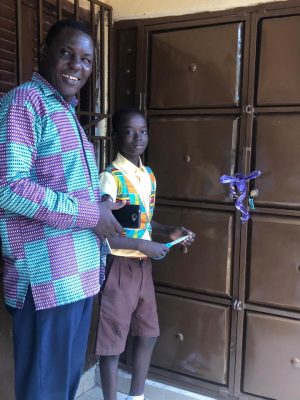To ensure that principles of our project are embedded in the very writing of this article, this article is written by a combination of Ghanaian and UK voices.
Note that that this article is mainly addressed to UK partners; future will relate more directly to ‘Southern’ partners.
One of the foundational principles of EduSpots as a project was to reflect on the power dynamics present within educational partnerships that are created between educators in western context and previously colonised nations. Through a variety of different approaches, we encourage participants to reflect on how their own positioning affects their view of the world and their impact as a global citizen.
In particular, we endeavour to constantly self-reflect on how our language might unintentionally further entrench divisions between individuals, avoiding what Adichie (2009) termed as a ‘single story’ prevailing with respect to a particular nation or culture. In relation to action, our work exists with an underlying acceptance of the power imbalance created by gift-giving, and recognising that ‘the helping Self often involves implicitly and unintentionally denigrating Others’ (Cook, 2008:20). Indeed, Stirrat and Henkel (1997) analyse the impact of NGOs giving ‘gifts’ to lower-income countries, suggesting that ‘there is no such thing as a free gift’, and that gift-giving can reaffirm difference due to the asymmetry involved in the relationships.
In the process of any educational experience, rather than to impart knowledge passively between recipients, we aim to ensure that participants on both sides are active co-creators in shaping their own knowledge frameworks. In addition to the role that our online courses and conferences (in both Ghana and the UK) play in promoting this educational vision, it is practically adopted in the physical spaces we create. These ‘spots’, which exist across Ghana, are based upon the central principle of empowering communities and individuals to lead their own educational programs.
‘Those truly committed to liberation must reject the banking concept in its entirety, adopting instead a concept of women and men as conscious beings and consciousness as consciousness intent upon the world.’ (Freire)
These are practical suggestions we employ in our work to attempt to rebalance the educational landscape. We are constantly learning and trying to improve what we do.
We welcome any feedback or responses to these thoughts in the discussion board below!
1. Donations
It is important to acknowledge that it can be seen that every act of gift transfer, can result in an accidental imposition of power. Even by looking at a western book, a Ghanaian child is likely become aware that the book is donated, and this may symbolize their own country’s inability to provide the material, and consequently the epistemological, sociological and economic superiority of the west.
Our suggestions to improve this imbalance are:
- Firstly, to ensure that communities have full ownership of what is given, and if possible, that they add something additional to the way in which the donation items are used and sustained. For example, within EduSpots communities always contribute their own materials and labour to the projects, and we have observed that those communities that contribute the most, also claim a greater sense of ownership of the project and play a more dynamic role in the determination of the educational activities.
- It is our belief that schools and individuals should be extremely cautious in donating gifts that do not have a sustainable impact upon a community. The reason for this, is that while it might seem that the donated item solves an immediate problem, a dependent relationship might be created in the longer term. For example, whilst giving a few disposable sanitary pads to a girl might initially enable her to go to school during her period, providing reusable pads, or even teaching girls to sew their own reusable pads, would ensure that the girl stays in education in the longer term, without dependency on an external sanitary donor.
- We try to avoid donating items in visible presentations where a western donor is shaking hands with the Ghanaian recipient – although we do recognise that this is a complex topic, as this is a practice that is common and important in Ghana, we try to donate items privately. Certainly, we avoid placing photos on our social media that positions ‘us’ as westerners in a position of ‘giving superiority’; indeed, we work hard to ensure that Reading Spots is seen as a Ghanaian organisation as much as a UK NGO (indeed, it is also registered in Ghana, with a Ghanaian Board of Directors).

2. Books
One thing to think about is whether your books unintentionally alienate the very individuals you hope to engage. We have found that pupils have become actively discouraged from reading after feeling overwhelmed by characters such as ‘Snow White’ with unfamiliar appearances and existing in a context that they could not relate to. To combat this, while we are glad to receive a huge quantity of western fiction at no cost through our UK book drives, we ensure that we invest in the provision of an African fiction and non-fiction section (bought in country), in each ‘spot’, in a visible position. It is also important to consider the role local dialects play, not only in obtaining books in local languages, but in using local language in the decoration and practices of projects.

3. Signs and Flags
Many NGOs paint their country’s flag upon ‘their’ donated buildings; whilst some may see this as a simple exhibition of pride in their work, others may interpret this as the height of neocolonialism – a flag has so often be used as a symbol to mark territory. Therefore, we avoid any usage of national flags other than the Ghanaian flag in our projects.
Interestingly, this isn’t always appreciated by our partner communities, who are very keen to show their association with a UK partner, and argue that a flag or UK reference, will increase the popularity of the project or school. However, to us, this highlights the very issue, and using own flag’s superiority as advertising, seems to only reproduce the imbalance in the relationship. For similar reasons we avoid creating signs that indicate that the project was donated by any western donor; instead communities label their projects clearly as a ‘community’ project.
Interesting, one Ghanaian volunteer explained the importance of the Ghanaian partner in this:
‘Locals should not attach overly high prestige or reputation to anything coming from the West in a manner that reinforces superiority or colonisation. When the people receiving aid continually find reputation for themselves by pointing out how this came from or was received from this European country or that one, they strengthen superiority.’

4. Fundraising
Our communities have suggested that it is important to include their voice in our UK fundraising activities, involving community members in the idea development process, and make suggestions on these fundraising activities prior to their execution so that they feel central to their own solution pipelines. Communities can also provide products to be sold that also enable them to share cultural practices.

5. “Teaching”
You might first want to consider whether ‘teaching’ is necessary in a country that is not your own, and whether partnership projects and interactions might be a better path forwards for school partnership trips and projects.
We suggest that if there is a program established whereby western pupils teach students in a partner country, that they teach pupils younger than them by some degree so that their knowledge on a particular topic is genuinely higher.
More importantly, we believe it is essential that pupils first observe the teachers in a partner school, firstly to ensure that they understand the educational context, but also to ensure that pupils reflect on why they would assume pedagogical superiority over teachers in the host country in the first instance, if indeed, they had. Creating a safe space for such discussions is such vital.
Lastly, we suggest that schools create partnership projects with pupils of similar ages and abilities on a topic that enables mutual participation and knowledge acquisition. Great topics for projects of this sort include environmental projects and discussion of local and global social issues, where both parities can also apply previously understood ideas to a new context.

5. Community engagement and leadership
Underpinning all of the above thoughts, is the primary need for the ‘recipient’ community to have genuine power in how the aims are set, how the activities are organised, and how the impact is evaluated. The foundational principle of EduSpots, is to co-create educational ‘spots’ that are owned, managed, and led by community members, with the intercultural and pedagogical input of volunteers.
Many UK schools wonder how we create such a high degree of community ownership and pride; this has been achieved through spending a significant amount of time identifying reliable and proactive individuals in each community, and creating a strong personal communication network between them via WhatsApp and through meeting at conferences. We have also found that our Youth Changemaker Program, a great route through into engage youth in Ghana’s remote areas, in partnership with African Science Academy.
We suggest that this ownership is symbolised through small actions such as communities cutting the ribbon when projects are commissioned, create the space that they want to further educational dreams in, and receive advice and ideas, without it packaged as of a higher worth.
Written by Cat Davison, Ali Eliasu, Claudia Vyvan, Stephen Tettegah


